




GETTING THERE
THE CITY
SIGHTS
RINGSTRASSE

MUSIC & THEATER
CHURCHES
MUSEUMS
HOTELS
SHOPPING
PUBLIC TRANSPORT
ÖBB NIGHTJET 360°

IMPRESSUM














location of the Roman town of "Vindobona". Today, visitors can admire the excavations from Roman times at Hoher Markt. www.roemermuseum.at In the year 1278, the Habsburg family started their
Joseph I and Empress Elisabeth (Sisi) are still wellremembered even today. Monuments and sights remind visitors of these glamorous times.

The city of Vienna is divided into 23 individual districts. The number of the district can be found on the street signs.
True Viennese refer to their district simply by number, for example "the first".





Several key scenes of the movie "The Third Man" were filmed in the "Vienna Underground". The tour shows filming locations and guides you through the streets of Vienna to the arch of the Wienfluss river.
 The canal network of the city encompasses 2,400 kilometres of canals.
The canal network of the city encompasses 2,400 kilometres of canals.


The area alongside the Danube canal is a perfect R&R spot in the middle of the city. Numerous cafes and even a "Badeschiff" (like a floating swimming pool) attract many guests. The Danube canal can

be reached by underground (Station Schwedenplatz). A tip: bring a drink and sit at the waterfront or enjoy the many graffiti.


The underground stop is at the Reichsbruecke bridge and opens a view of the highest building of the country: the Donauturm (Danube Tower) and the DC Tower 1. The Donauinsel is an island, 21
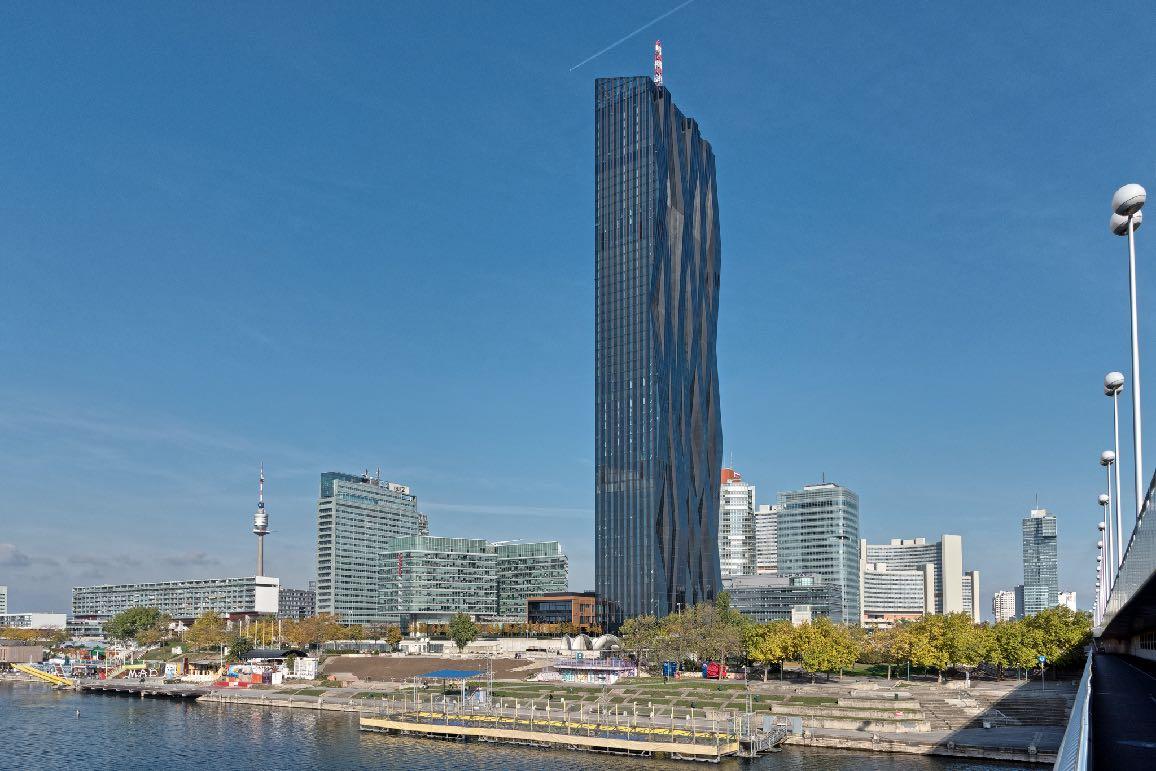
kilometres long, and offers fun for the whole family. Every year, the huge festival "Donauinselfest" takes place here.
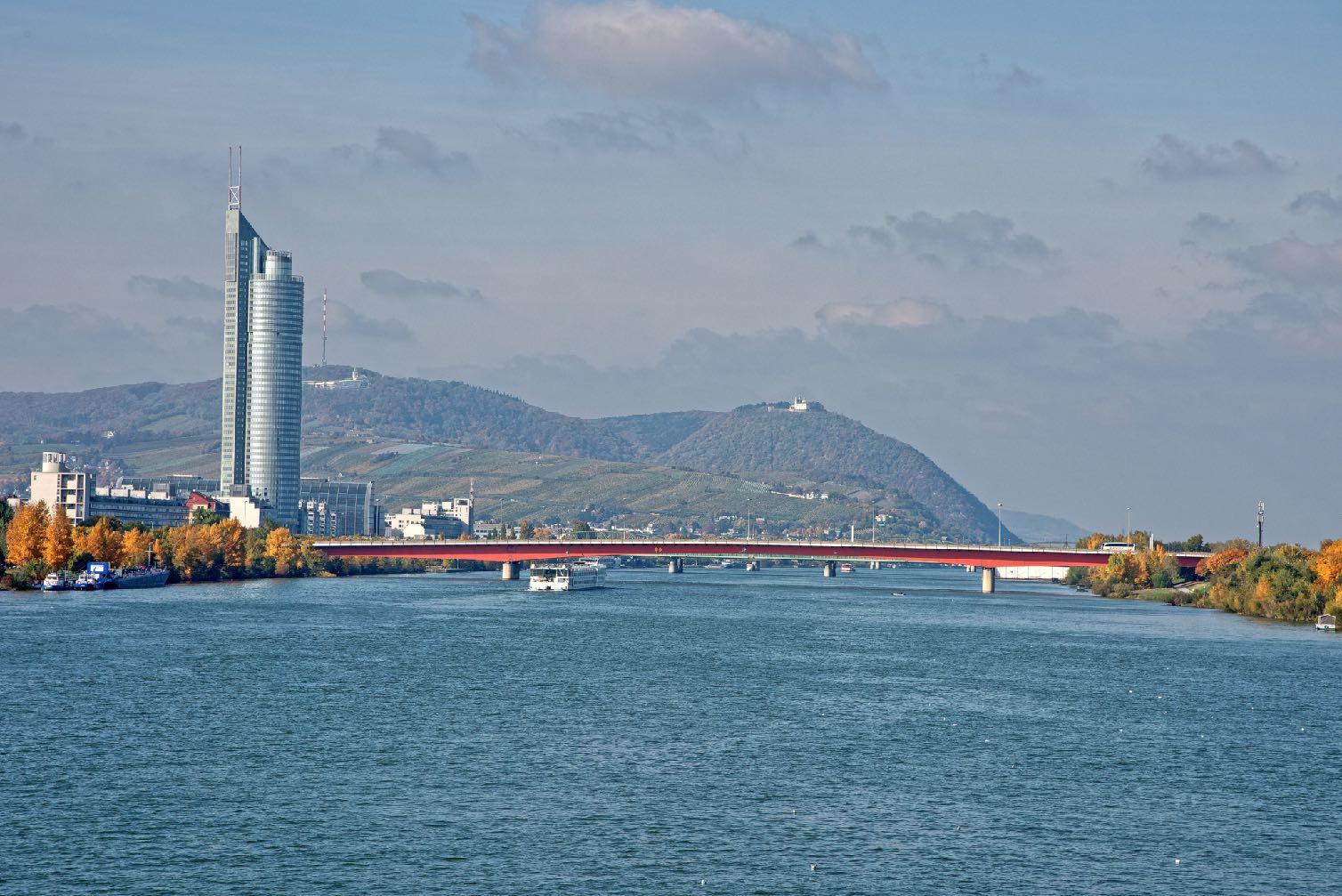

“NO TITLE” - BRUNO GIRONCOLI

The original construction work that resulted in what today is known as the Graben were financed with the ransom collected for the English King Richard the Lionheart. Today, the Graben is a posh boule-

vard, where seeing and being seen is very important. Shops and cafes are found alongside the street.
STOCK-IM-EISEN-PLATZ



The Burggarten park is the home of many colorful butter flies. With waterfalls and ponds, the proprietors tried to reconstruct a tropical rain forest, which serves as a habitat for numerous exotic ani-
mals. Besides the butter flies, which fly around freely in the building, visitors can also see animals hatch.


SCHÖNBRUNN

This was Empress Sisi's abode during the summer months. The castle has 1,441 rooms. The Hall of Mirrors was the location for Mozart's performance when he was only six years old. The Grand Galerie
Schönbrunn 10A 10,58,60





Maria Theresia's husband, Emperor Franz I Stephan von Lothringen, presented the Menagerie in Schoenbrunn Castle to his guests in 1752. The animals seemed to enjoy Vienna, and the first
african elephant baby was born in Schoenbrunn in 1906, as well as the panda bear Fu Long, who was also born here.


Emperor Joseph II opened the Prater in 1766 for the public. The former hunting grounds of the Emperor encompass six square kilometres. The amusement park, in season from March to October,
is called "Wurstelprater". From Praterstern Station, visitors can admire the giant ferris wheel, which is open year-round.




It is home to the UNO City and the Austria Center Vienna. Besides modern offi ce buildings and apartments, the Kaiserwasser area and the Old Danube offer optimal opportunities for rest and recreation. The UNO City and Austria Center Vien-



The Kahlenberg hill is a popular destination. The "Monte Glatzo", what the hill is called in Viennese dialect, was the route on which Polish King Sobieski and the reserve army came to the aid of occu-

pied Vienna in 1683. The eradication of the Ottoman army of Kara Mustafa and the liberation of Hungary were the result.




Karl Lueger was mayor of Vienna from 1897 to 1920. On this square is the Café Prueckel, which is frequented predominantly by students from the nearby University of Vienna.

The cafe is under monument protection and is popular especially for its 1950s-style interior decorati ons.
The Vienna Stadtpark was the first public park of the city. Over time, more and more monuments were erected in the park, among them the golden Johann-Strauss-Memorial.



Here is also a famous spot for taking pictures: the Mozart Memorial. The ample park, which also houses the Butter fly House and a cafe, leads visitors to the museum Albertina.

During the warmer months, the wide green serves as a recreation and relaxation space for many visitors.

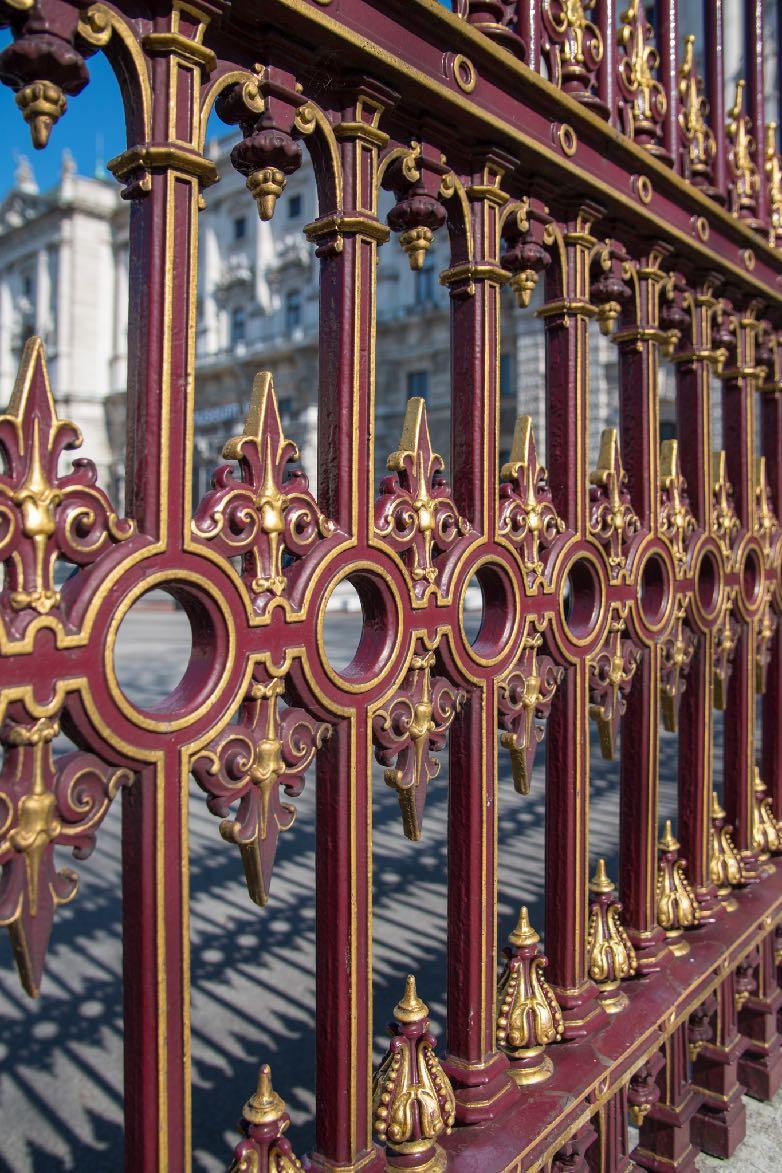
The former master builder of the Cologne cathedral, Friedrich von Schmidt, completed the 100-metre building in the year 1883. The City Hall as well as the square in front of it are both well-booked
event locations. Here is also the location for the Life Ball. During winter, advent markets and ice skating ranks are the highlights for visitors.

From 1883 to 1918, the “Reichsrat” (Imperial Council) building hosted many representatives from countries which were members of the council. After the Second World War, the building hosted the Na-
tional Council and the Federal Council. The PallasAthene-Fountain in front of the building was completed in 1902 and is particularly impressive.

Across the street from the parliament is the "Rose Garden" of Vienna. The Volksgarten park offers visitors the opportunity to become a sponsor for a favorite rose.

When you enter the park from the parliament, you will see the Theseus temple, which is a smaller replica of Athens' Theseions.
The name of the square refers to the two statues of horsemen, which stem from Anton Dominik Fernkorn. When entering the square from the Ring, Archduke Karl is on the left and Eugen on the right.

The Heldenplatz hosts parades and demonstrations of the Austrian Armed Forces on October 26, Austria's National Holiday.
The memorial of Empress Maria Theresia has been on the square since 1999. To the right and left of the memorial are the Museums of Art History and Natural History.
Right behind the statue is the Museumsquartier (museum quarter), which houses the Leopold Museum amongst many others and offers a broad gastronomical variety.

The University of Vienna was founded in 1365 and is the oldest and largest university in the Germanspeaking world.

The university can be reached via the Schottentor station, which is a hub for ten tramway lines, two bus lines and one underground train line.
The Moelker Bastei was part of Vienna's fortification. The memorial shows Andreas von Liebenberg, the mayor during the second siege by the Turks.
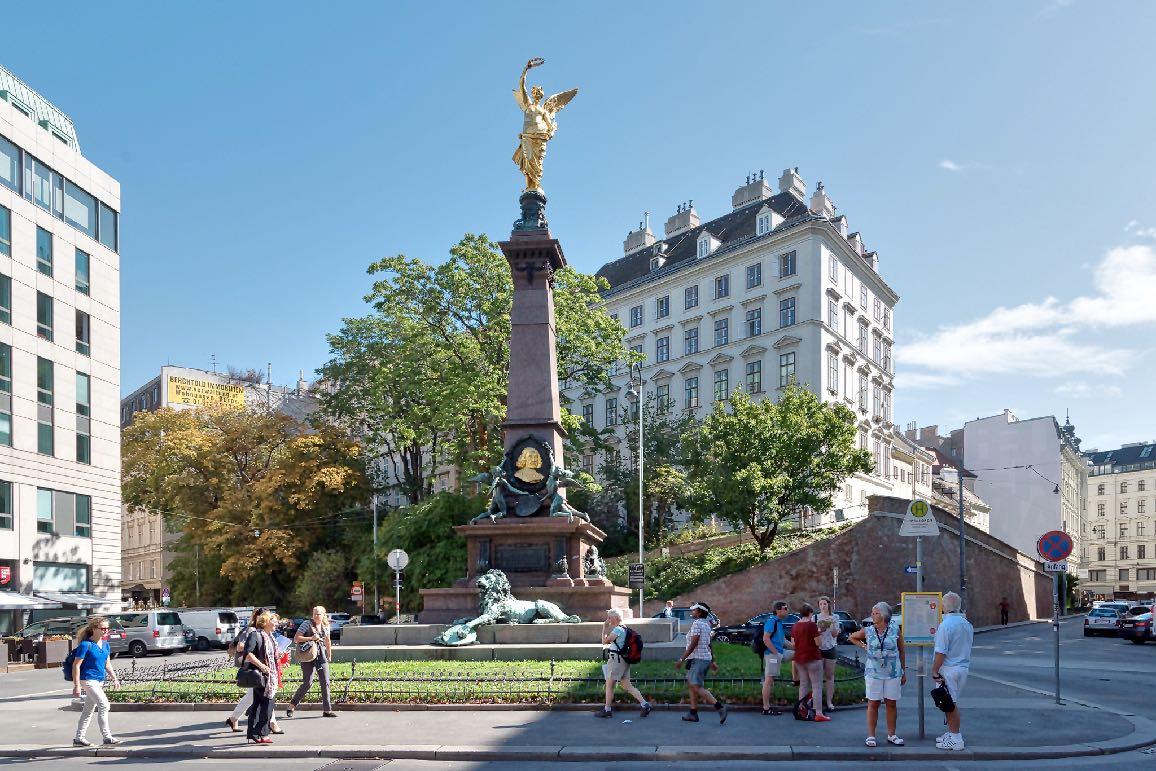
Behind it, in the Pasqualihouse, Ludwig van Beethoven composed some of his most influential works from 1804 to 1815.

The square is dedicated to the memorial of Infantry Regiment Hoch- and Deutschmeister No. 4. The monument is in front of the Rossau Barracks.

The history of the legendary regiment “Hoch- and Deutschmeister” dates back to the time of the Turkish Wars in 1695. In the year 1895, it became Vienna's home regiment.





The k.&k. Vienna Regiment Orchestra IR4 - “Hochand Deutschmeister” developed from the continuation of the traditional Regiment Bands from imperial times. Throughout the entire year, the popular or-
chestra puts on shows and performances. Information and dates can be found on the website: www.regimentskapelle.at and on facebook: www.facebook.com/ir4wien













The largest church of the 10th district is near Reumannplatz. The church is dedicated to Saint Antony of Padua.

The impressive building is in the centre of Antonsplatz square, a large green area.

The Francis of Assisi church was modeled after the St. Martin church in Cologne. The house of prayer was dedicated in 1913 and is also called "Emperor Jubilee Church" or "Mexico Church". The best view
of the church is from the Danube, which is why we chose the corresponding underground station.
KARLSKIRCHE
When the pestilence ravaged Vienna in 1713, Emperor Karl VI. vowed to build a church for Karl Borromaeus, if the pestilence were averted.
 On the inside, an elevator takes visitors up to the dome to admire the frescos by Michael Rottmeyr up close.
On the inside, an elevator takes visitors up to the dome to admire the frescos by Michael Rottmeyr up close.
inoperable. Until today, the Viennese refer to a use less complaint as "complaining at the Department of Salt". Schwedenplatz 2A 1,2

The church at Baumgartner Hoehe was built by Otto Wagner. The Church of Saint Leopold or OttoWagner-Church lies on the Baumgartner Hoehe, a centre for social medicine.

The location which is in a nice place for a relaxing walk in one of the green zones of the City, is reachable using busses 47A or 48A.
The "Steffl" is not only the landmark of Vienna, but the Cathedral St. Stephen of Vienna is also the most well-known church of Austria.
Originally, two high towers were planned, but the north tower only made it to 68 metres, whereas the south tower measures 136,4 metres in height.

The Austrian-Hungarian monarchy did not allow for a church to be higher than St. Stephen's Cathedral.
The largest church of Austria, the Cathedral of Maria-Conception in Linz, is shorter by two metres.


In 1853, Emperor Franz Joseph I. narrowly escaped an assassination attempt. In gratitude, Archduke Ferdinand Maximilian, who later became Emperor of Mexico, called for a charity collection.
The Votivchurch is the symbol for the cohabitation of all nations of the Danube Monarchy and the most significant neo-Gothic sacral building in the world.





The name stems from the founder of the collection, Albert Casimir Duke of Saxon-Teschen. The Albertina is one of the most frequently visited muse-
ums of Austria and is an important part of a visit to Vienna, especially for those interested in art.

The Upper Belvedere is of particular importance for Austria. On May 15, 1955, Austria's Treaty was signed in the Marble Hall. The Belvedere was the summer residence of Prince Eugen. Today, it is an

D,O,18 Quartier Belvedere
important museum with the world's largest collection of Gustav Klimt paintings.




The Lower Belvedere, the Orangerie and the pompous Stables house exhibitions on a regular basis. The pompous decor of the rooms is particu-
71 Unteres Belvedere
larly impressive. Here, visitors can experience firsthand, how the royals of the monarchy used to live.


The history of the Austrian Armed Forces from the Thirty Years' War to the youngest history. Impressive exhibitions with countless exhibits.


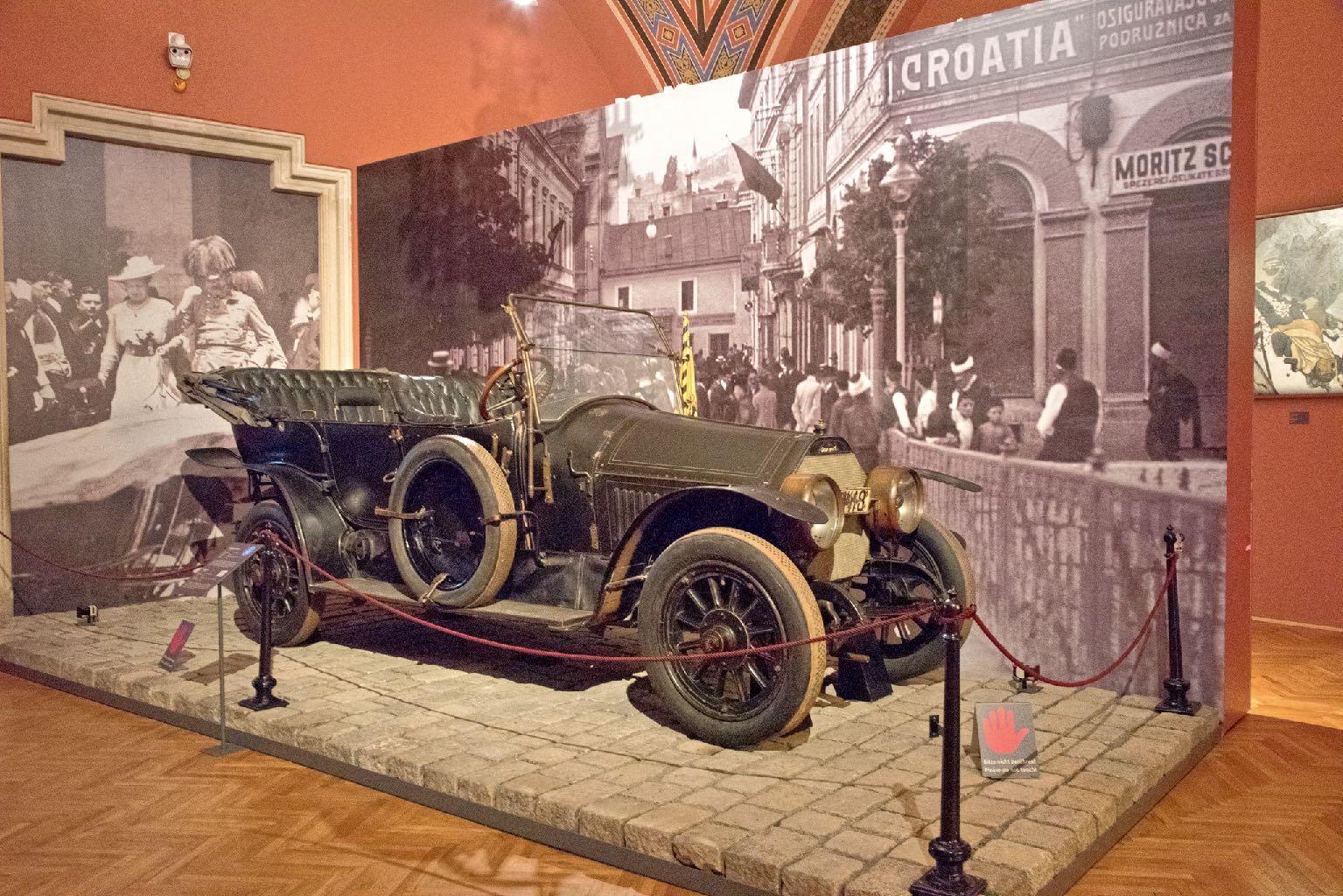
When looking from the Ring to Empress Maria Theresia, the Museum of Art History is to the left side. When entering the museum, one is overwhelmed by the pompous decor.

The upper level is a beautiful cafe. It is a breathtaking museum with many highlights.




The ceremonial room of the Austrian National Library is one of the most beautiful halls of its kind and shows the largest baroque library of Europe. The National Library houses more than 200,000
volumes. Visitors can also admire the Prinz Eugen collection, which comprises more than 15,000 volumes.

Across from the Museum of Art History is the Museum of Natural History. An incredible 30 million exhibits make this museum one of the most important collections world-wide. The "tame" dinosaur is
particularly popular with young visitors. It is an animatronics model of an Allosaurus.



The Palais Palffy houses the unusual Museum of Phantastic Art. Here you will find exhibits of Ernst Fuchs, Arnulf Rainer, Rudolf Hausner, Arik Brauer or Curt Stenvert. Furthermore, visitors can admire
fantastic, surreal and visionary paintings of important international artists.






The so-called Ring Street Hotels have a long-standing tradition and many have a melodious name. In every district, visitors will find hotels in their price range. Tourists should make sure their accommo-
dation is well connected to the great public transport network. At www.wien.info visitors can quickly find the best hotel for their needs.





Even though every district has its own shopping street, boulevards like Kärntnerstrasse, Graben or Mariahilferstrasse are particularly attracting the shopaholics among the visitors.
Practically all luxury brands of fashion and jewelry try to seduce those who browse the windows.


Markets have a high signi fi cance in Vienna. Naschmarkt, Karmelitermarkt, Yppenplaty and Brunnenmarkt - to name a few - allow for a typical Viennese shopping trip. But because the Viennese
are known to be very comfortable, those markets also provide for those who want to dine out. You can find more information about Vienna's markets on www.wien.info

The shopping centres of Vienna have one thing in common: They are easily accessible by public transport. A small selection of shopping centres include BahnhofCity at the Main Station and West-
 bahnhof, Donau Zentrum, The Mall in Vienna Mitte, Millenium City, Riverside, SCN and SCS.
bahnhof, Donau Zentrum, The Mall in Vienna Mitte, Millenium City, Riverside, SCN and SCS.




Within Vienna, the public transportation provider Wiener Linien offers a network of busses, tramways and subway trains for quick and comfortable transportation. Tickets for public transit can be
www.vor.at
bought online even before your arrival, at the numerous ticket machines or at the Wiener Linien vending booths.

Wiener Linien offers a network of busses, tramways and subway trains for quick and comfortable transportation. Tickets for public transit can be bought online even before your arrival, at the nu-

www.viennacitycard.at
merous ticket machines or at the Wiener Linien vending booths. The Vienna-Card includes unlimited transportation within the entire public transit network of Austria's capital. There are two types of


25 minutes and earphones tell visitors interesting facts in eight languages as well as in the local di-
Schwedenplatz 2A 1,2
first tour leaves at 10am and the last tour at 5.30pm.
Vienna's 100 bus lines get you comfortably and safely to your destination. During the night, busses of the "Nightline" serve the network.
Tickets for the Wiener Linien can be bought at the vending machines in the underground stations, at tobacconists, as well as online.

The first horse-drawn tramway operated in Vienna in 1865. Over time, the Vienna tramway network became the fifth-largest in the world.
A special connection is the "Badner Bahn", which takes you from the Opera directly to Baden near Vienna. In Vienna, the tramway is affectionately called "Bim".

The underground network has been serving the population since 1978. Since most underground stations have multiple exits, which may be located far from each other, it is advised to arrange for a
very specific meeting point (name the exact exit) when meeting somebody at an underground station.

Schwedenplatz is the departure point for sightseeing and line traffic on the Danube river. It is also the docking point for the Twin City Liner, which connects Vienna with Bratislava. Further to the West, in
Nussdorf (tramway line D) is the landing stage Vienna-Nussdorf, where roundtrip ships and excursion boats dock.

Operated by the Austrian Federal Railways (ÖBB), the rapid transit trains are important means of transport in Vienna. It is advantageous to be able to cross long distances even beyond the city limits
without having to change trains. Tickets have to be bought in advance at the vending machines or onlie. No tickets are sold on trains. www.obb.at





Videos & 360° photos of the inside oebb360.com

with the ÖBB nightjet to Vienna 122













Videos & 360° photos of the inside oebb360.com
with the ÖBB nightjet to Vienna


Videos & 360° photos of the inside oebb360.com

with the ÖBB nightjet to Vienna 127
DELUXE ABTEIL




The Team
This eBook was made possible by the kind support of Vienna Tourist Board and OBB.
Photographs and texts
All photographs (unless specified) and texts by Rudolf J. Strutz, Travel information: ÖBB. © AuVi – Rudolf J. Strutz 2023
Copyright
The eBook is created under the Creative Commons License: Attribution and Noncommercial and NoDerivatives.
Sales of this eBook
This eBook is free of charge.
Logos, brand- and company names


All logos, brand- and company names are only used to provide relevant information in this eBook. Usage of any of them outside of this eBook has to be cleared with the appropriate owners.
Fotos Rechte
Fotos & Texte (wenn nicht anders angeben):
AT06_EN_Wien

Book online or even check the current schedule directly on the mobile phone: all this and more offers the new booking app ÖBB. Absolutely easy and comfortable to use.


BIT.LY/OBB-ONLINE
BIT.LY/OBB-ONLINE-AND
SCOTTY mobil displays the timetables of all public transport and will help you plan your itinerary optimally. In AppStore there is also a special version for the iPad.
AuVi publications - Rudolf Strutz
Hasengasse 33/25
1100 Wien
eMail: admin@auvi.me
UID: ATU38469402
Visit us:
Facebook: facebook.com/auvi.me/
Instagram: instagram.com/rsvienna/
Web: www.auvi.info

APPLE.CO/1SBIIW5
BIT.LY/SCOTTY-AND